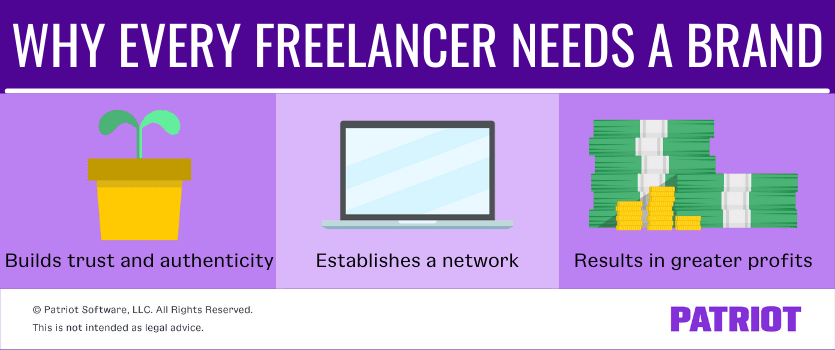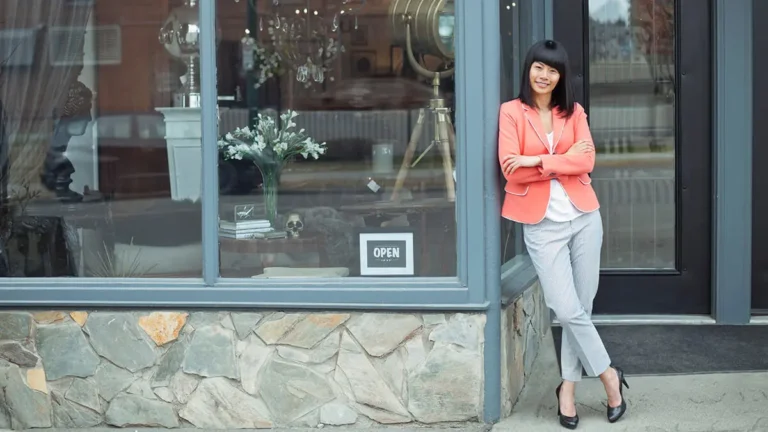Building a brand as a freelancer is a powerful way to gain recognition and make yourself memorable.
It can take consumers around five to seven impressions to remember a brand, and if it’s captivating, you might retain some loyal clients. When you build a brand that people trust, business can boom. In fact, ensuring consistent branding across all platforms can enhance revenue by up to 23%.
Read on to learn what a brand is, why you need one, and how to build it.
Defining a brand
Ultimately, your brand sums up perceptions about who you are, your vision, and the products or services you sell. Everything you do creates perceptions of your brand, including your tone on social media platforms, how you engage with clients, how you package your work, and how you deliver it.
Consistent branding can also ensure better consumer loyalty from the competition, with 59% of consumers noting that they would rather buy new products from brands they already trust.
Why every freelancer needs a brand
Developing a brand can yield the following advantages:
Builds trust and authenticity in business: As personal branding develops, you build trust with clients through consistency and reliability. Soon, this becomes a huge part of your competitive edge because people will trust your capabilities and expertise. This also distinguishes you from the competition.
Establishes a network: Your network will follow when your brand is strong. The more people who know who you are (and follow you on social channels such as Facebook, Instagram, LinkedIn, and Twitter), the greater your network. This will undoubtedly lead to more work opportunities and potential collaboration projects, especially if you’re in the creative world. This results in greater opportunities and the potential for even more work.
Results in greater profits: When your brand is well-known and respected and your network is booming, you can charge premium rates for your products and services. You’ll also enjoy a vast breadth of projects, meaning that you can work on things that really excite you.

Your brand is your voice. It conveys the things that are important to you, your tone of voice, and how you interact with your clients. More than that, it’s the heart of your business. Naturally, freelancers will have different brand identities depending on what they do.
If you’re a comedian, you’ll probably have a witty, more light-hearted tone of voice, possibly sharing jokes and funny memes. But if you’re the creator of a scientifically-driven, environmentally-conscious skincare range, you’ll likely lead with expert knowledge that positions you as an authority on the subject. You’ll also work hard to up your sustainability profile and showcase how your commitment to the environment extends to every element of your business.
So, how exactly do you find your brand?
A great way to figure out your brand is to employ the so-called golden circle method, whereby you ask the what, the how, and the why of your business—the why part is perhaps the most important element.
While the what relates to what you do and the how relates to how you do it, the why is all about your core purpose. Knowing why you do what you do can successfully help you create your dream brand.
How to build a brand as a freelancer
So, now you know why branding is essential. But, how exactly do you build a brand as a freelancer? Here are some top tips.
1. Share your story
Sharing your startup story or telling people how you became an entrepreneur is a fantastic way to build meaningful relationships with clients and highlight your success. Do this by showcasing your wins and revealing to clients how your services have helped people.
It’s essential to share your story and show the world your voice. Whether you’re a freelance photographer with a penchant for love and wedding photography or a hard-hitting news journalist who loves to get to the bottom of complex issues.
You can share your story in several ways, including:
● Blog writing
● Social media posts
● Weekly newsletters
● A riveting about section
● Client testimonials
2. Write a blog
A weekly or monthly blog, emailed or shared with clients and potential clients, is a fantastic way to keep people in the loop.
Share the latest innovations in your field, fascinating facts, new products and services, or little anecdotes about your working week. Having a blog keeps clients engaged and makes readers feel like they’re part of your story.
3. Use fantastic visuals
Visual identity is key to building your brand, especially for social media pages, business cards, and your website. In fact, consistent color use in logos can enhance brand recognition by up to 80%, so be sure to invest time and energy into your visuals.
Think carefully about your color palette, font style, and graphics before building your website. If possible, use a professional service to create powerful visual imagery.
4. Make the most of social media
Social media is a brilliant way to reach a wider audience and share your work with the world. Use social profiles to show why you’re an authority on the subject.
Visual and communicative consistency also builds trust in your brand. Depending on your field, you might use social media to plan competitions and giveaways and boost your brand.
5. Remain consistent and stay organized
Consistency is key if you want to create a brand that people trust. A large part of staying consistent is remaining organized and keeping on track with various projects and tasks. This is why so many freelancers utilize online management platforms, such as Indy, to ensure on-time job completion.
Management programs offer essential tools for freelancers, including quick invoice templates, online calendars, time trackers, task checkers, and communication hubs. Staying on board with projects and keeping in touch with clients is the best way to remain reliable and enhance trust.
Key takeaways
Your brand is the sum of public perceptions about who you are. It’s the voice of your business, and at a deeper level, the heart and soul of your work.
As a starting point, take time to figure out why you do what you do. A positive brand identity will ultimately build client trust, give you a competitive edge, enhance your network, and create unparalleled opportunities.
This is not intended as legal advice; for more information, please click here.
These views are made solely by the author.



